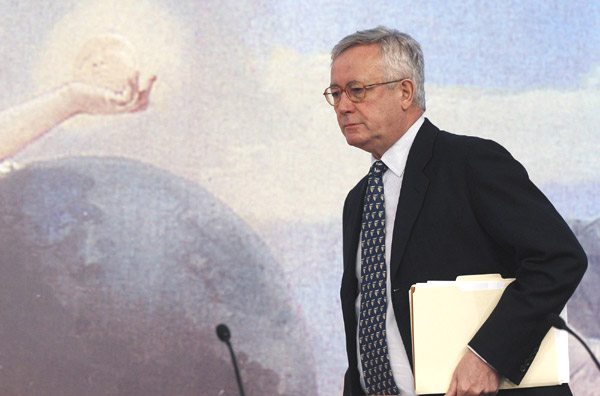Economy
Italy calls for euro bonds, UK backs fiscal union
Updated: 2011-08-14 08:04
(Agencies)
|
 Italy's Finance Minister Giulio Tremonti arrives for a news conference at Chigi Palace in Rome August 13, 2011. [Photo/Agencies] |
ROME - Italian Economy Minister Giulio Tremonti stepped up calls for a more coordinated response to the euro zone debt crisis, including the creation of euro bonds, ahead of a crucial Franco-German summit next week.
Tremonti returned to proposals for jointly-issued bonds that would effectively make individual governments' debt a common burden, saying they were the "master solution" to the euro zone debt crisis.
"We would not have arrived where we are if we had had the euro bond," he said on Saturday.
However the idea was immediately rejected by German Finance Minister Wolfgang Schaeuble, who said such bonds would undermine the basis for the single currency by weakening fiscal discipline among member states.
"I rule out euro bonds for as long as member states conduct their own financial policies, and we need differing interest rates so that there are possibilities of incentives and sanctions to force fiscal solidity," he told Der Spiegel weekly.
"Without that kind of solidity, there is no foundation for a joint currency," he added, according to extracts of an interview released ahead of publication.
The comments underline the sharp divisions hampering efforts to coordinate a response to the euro zone debt crisis, which escalated dramatically last month as markets turned their fire on Italy, one of the bloc's most heavily indebted countries.
German Chancellor Angela Merkel and French President Nicolas Sarkozy are due to meet in Paris on Tuesday, with what Tremonti called "strong expectations" hanging over the encounter.
Underlining the concerns about the spreading euro zone debt crisis which have grown outside the currency bloc, Britain's Finance Minister George Osborne said some kind of fiscal union may now be needed for the 17-member euro area.
Asked if the only answer for the euro zone was some form of fiscal union, he told BBC radio: "The short answer is yes."
What is at stake was highlighted by a new poll for the Bild am Sonntag newspaper on Saturday which showed 31 percent of Germans believe the euro will be gone by 2021.
E-paper

Going with the flow
White-collar workers find a traditional exercise helps them with the frustrations of city life
The light touch
Long way to go
Outdoor success
Specials

Star journalist remembered
Friends, colleagues attended a memorial service to pay tribute to veteran reporter Li Xing in US.

Robots seen as employer-friendly
Robots are not new to industrial manufacturing. They have been in use since the 1960s.

A prosperous future
Wedding website hopes to lure chinese couples
